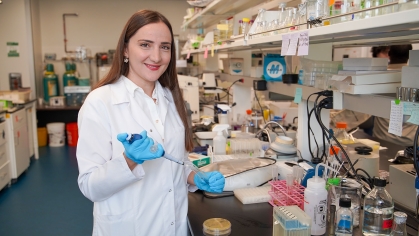Branching Out: Luo’s Growth Began with Solid Roots
For assistant professor, Asian American and Pacific Islander Heritage Month is all about family
May 12, 2022
Seated in her Rutgers University–Camden office, Rufan Luo’s memories of Beijing come flooding back. It was a happy childhood, recalled the Rutgers University–Camden researcher. Being an only child, she admittedly sometimes felt lonely, but enjoyed a close relationship with her parents.
Today, despite being nearly 7,000 miles away and more than a decade since arriving in the United States, the Cherry Hill resident still feels her parents’ presence. It is in her drive and determination, her positive outlook, and the diplomas hung neatly on the wall. And it is at the heart of her innovative research studying parenting and child development.
“I enjoy observing the interactions between parents and children,” said the assistant professor of psychology. “It’s an important component of my daily research and it often reminds me of how my parents have helped me become who I am.”

“I enjoy observing the interactions between parents and children. It’s an important component of my daily research and it often reminds me of how my parents have helped me become who I am.” – Rufan Luo
It is fitting than that, in a word, when Luo thinks of Asian American and Pacific Islander Heritage Month, celebrated throughout the United States in May, she thinks of “family.” Luo’s stories of kinship, however, don’t end the world over in China. One family member who holds a special place in her heart is her aunt, Vickie Gao, who arrived in the United States from China more than 30 years ago and passed away last year. Luo recalled that, when she first arrived in the United States as a Ph.D. student at New York University, her aunt and her family picked her up from the airport, took her under their wings, and helped her to adjust to the exciting and overwhelming life of New York City.
Remembering her aunt as “kind, altruistic, hardworking, and strong,” Luo said that what she admired most was her dedication to the minority community. “No matter where she lived, she stood up for social justice and treated her neighbors like family,” she said. “She was always the first to step up when someone needed help.”
With strong familial ties, it is no surprise that Luo focuses her research in part on the influences of early parent-child relationships for healthy development, particularly language development by children in dual or multilingual households. She is especially interested in studying infants’ and preschool children’s learning experiences within the home context. She explained that children’s home experiences in the first few years of their lives can make an enormous difference in their school performance and wellbeing years later. Her research thus highlights multiple ways for parents and caregivers to support children’s development of early language and school readiness skills.

Luo focuses her research in part on the influences of early parent-child relationships for healthy development.
Additionally, Luo and her colleagues have found that the ways in which parents raise and interact with their children are deeply influenced by their cultural values and traditions, ethnic and linguistic backgrounds, and socioeconomic status (SES). Their findings, she said, are able to help policymakers, practitioners, and educators address the specific needs of families from ethnic/language minority or low-SES backgrounds. “Just as importantly, the studies also recognize the unique strengths and assets of these families,” said Luo, who recently earned a 2022 Chancellor’s Award for Outstanding Research and Creative Activity.
The researchers have also focused on creating interventions designed to help parents and children engage with each other in ways to strengthen parent-child bonds and help children overcome the challenges – such as navigating the English environment at school – of growing up in a multilingual household. Luo stresses that growing up bilingual or multilingual gives children the valuable opportunity to become proficient bilinguals/multilinguals and can benefit children’s cognitive and social development. However, children from language minority families have a disproportionately high rate of living in poverty. “Additionally, the school learning environment is often disconnected from language minority children’s experiences at home,” she said.

Luo and her colleagues have found that the ways in which parents raise and interact with their children is deeply influenced by their cultural values and traditions, ethnic and linguistic backgrounds, and socioeconomic status (SES).
As a multilingual speaker herself, Luo noted that she has a personal interest in her research. She has come to know intimately that the types of language people use impacts how they think and feel, express themselves, interact with others, and perceive the world. “I view language as a powerful tool that allows children to navigate and learn from their social surroundings,” she said. “That’s why I’m so interested in studying early language development.”
Moreover, it is easy for Luo to see herself in her work. “When I work with children and families from ethnic/language minority or immigration backgrounds, I can relate to their experiences,” she said. “They resonate with me.”
Putting her research aside, Luo has one last tidbit of advice for young people, including those who may look up to her. “It’s important to keep an open mind, both for yourself and to others,” she said. “People’s experiences and characteristics, no matter their gender, race/ethnicity, or country of origin, influence who they are. Nonetheless, they do not define who they will become.”



